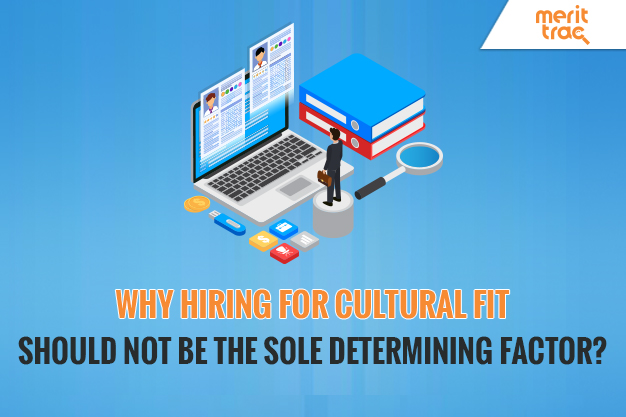
Why Hiring for Cultural Fit Should not be the Sole Determining Factor?
Date: 29/10/2019 | Posted by: MeritTrac | Category: Corporate , Cultural Fit , Recruitment
Why Hiring for Cultural Fit Should not be the Sole Determining Factor?
For nearly the past 15 years or so, organisations have laboured over carefully defining every aspect that makes their ‘corporate culture’ – and it’s with good reason. People whose values, beliefs, aspirations, and attitudes match with those of the organisation have been proven to perform better, be more engaged and satisfied at work, and be loyal to their employers. Several entrepreneurs including Zappos CEO Tony Hseih have famously said they won’t hire stellar candidates if they don’t fit their company culture. They argue that hiring for cultural-fitcultural fit over competencies is like sacrificing short-term benefits for long-term gains. But obsessing over company culture can blind-sight companies. That’s because while most companies have defined their culture well, they have failed to make it objective and measurable. Digest this - if cultural fit accounts for only 10% of a hiring decision, and the other 90% is based on skills and abilities, candidates who represent diversity have a better chance of being selected than if cultural fit comprises 75% of the decision.
What happens when hiring decisions are based solely on cultural fit?
Given the tight labour markets today, getting the right talent to fill open positions remains recruiters’ biggest challenge. Obsessing over cultural fit at such times and neglecting other factors such as skills and experience can seriously set companies back. Here’s how:
Personality overshadows performance: While hiring for soft skills is more important than ever in today’s corporate world, hiring managers must make the distinction as to which soft skills matter to which position. For instance, when hiring for developers, while a friendly personality trait may be a good to have, it lets the person work well in a team; being gregarious and outgoing may not really impact his/her work. LinkedIn’s report on most in-demand soft skills rates communication, being organised, and the ability to work with a team as top skills, regardless of job roles and industries.
Homogeneity stifles innovation: A homogenous workforce where everyone’s attitudes, behaviours, preferences and thinking matches is unlikely to see any innovation as the very premise of it is to reimagine the current ways of working. Hiring for cultural fit (in cases where cultural fit isn’t objective) often leads to managers hiring more people like them, which in turn makes everyone too comfortable at work and stifles innovation. On the other hand, diversity in thought or cognitive diversitycognitive diversity as it is called is about inclusion of people who have different ways of thinking, different viewpoints and different skill sets in a team or business group. Leadership expert Sara Canaday in her book “You – According to Them” says, “A culture that encourages (explicitly or implicitly) conformity of thought breeds stagnation and imperils a company.” Hiring for cultural fit also hinders other forms of diversity at the workplace such as in terms of gender, ethnicities, age, geographies, and more. Given that diversity feeds creativity – the most important quality in the modern business environment, organisations simply can’t afford to pass it up.
Toxic culture perpetuates bias: From Uber to Google and Apple - toxic corporate culture has been a heated topic of discussion recently, ever since former employees exposed these firms for their discriminatory ‘bro’ culture. When hiring managers hire solely on cultural fit, in many cases, they become promoters of the toxic company culture without even realizing their folly. Often, hiring managers end up hiring their ‘buddies’ when prioritizing attributes like personality, hobbies, and passions and neglecting hard skills and relevant experience. A study that surveyed hiring managers who hired based on a candidate’s personality, revealed that they ended up hiring more candidates from the most privileged backgrounds. This wasn’t by intention but because these organisations used a definition of merit that was linked closely to social class, preferring accomplishments, activities, knowledge, and interactional styles that require significant investments of time, money, and energy not only by job applicants but also by their parents. In their pursuit of the elite, the firm ended up losing the best and the brightest talent.
Striking the right balance between culture and skills
While the debate between what matters most - cultural-fit or skills can last forever, the good news is it doesn’t have to be a trade-off at all. Rather, the way forward for organisations is to look for the sweet-spot – get the talent that has the absolutely essential soft skills, the required hard skills and build the rest on-the-job. Cultural fit can be developed through the right mentoring and team building opportunities while technical/hard skills can be boosted through trainings and certifications.
References












 Sales Hotline: USA: +1 646 916 0939 / Others: +91 80619 14700
Sales Hotline: USA: +1 646 916 0939 / Others: +91 80619 14700


